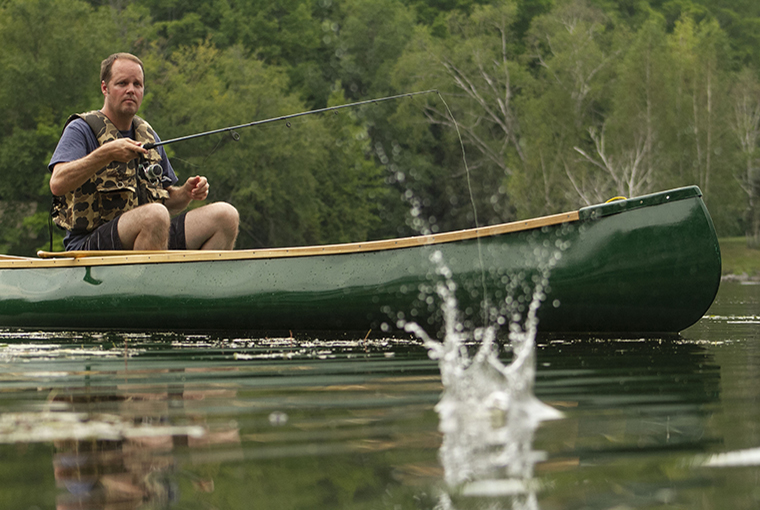
It wasn’t until my son Joseph and I were plying the weed-choked Scugog River just north of Lindsay during this year’s bass opener that I really fully appreciated our newly refurbished Wolverine canoe.
The vintage flat-bottomed craft glided effortlessly over thick aquatic vegetation that would slow our other fibreglass canoe to a stop, providing access to nooks and crannies we’d never wet lines in before on this home water.
It was a timely revelation – our late 2020 restoration of the canoe prompted my quest to learn more about its creator. It didn’t take long for me to realize details about Wolverine are as elusive as the solitary animal itself.
Canoe about 50 years old
There’s not much information online, save for a listing advertising the sale of the moulds posted in 2008. Fortunately for me, it was enough to reach Shawn Sadler, whose father managed the company before acquiring the rights to the name.
The Temiskaming Shores-area resident has a lifetime of memories with the canoe – more on that later. Owner of Taiga Endeavors, he has partnered with Gergely Lánci of Blacksheep Customs in Sudbury to make lightweight carbon composite Wolverines.
Our Wolverine is one of the oldest Sadler knows about. My wife’s parents, Ron and Barb Rogers, got it from friends Joan and George Sims when they moved from central to rural Cambridge in August 1994. The Sims bought it from a store in Ayr in 1972.
Backroads Bill Steer, a northern Ontario journalist who has also been researching Wolverine, believes our canoe is at best, one of the first 100, and at worst, one of the first 300, made in Welland before the builder moved to Wawa.
Craft appreciated by anglers, hunters
Wolverine canoes have earned praise from anglers and hunters like Martin Bernardin, who has long appreciated them for accessing hard-to-reach places.
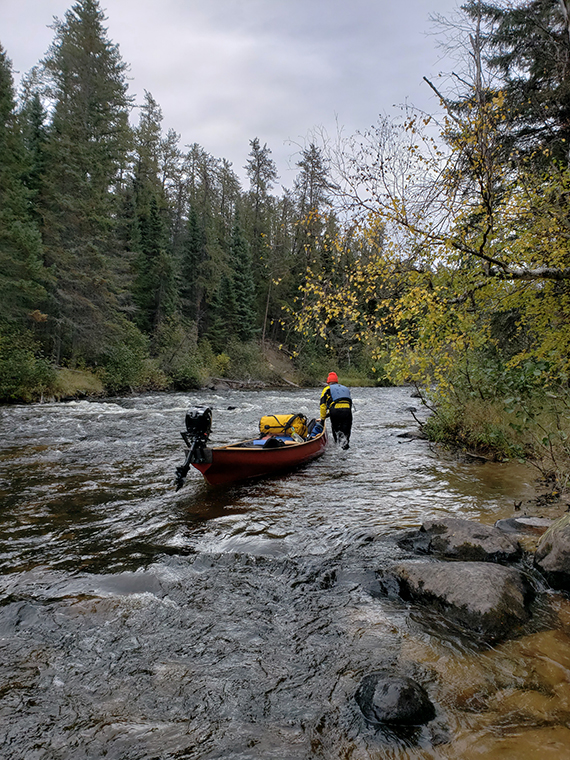
The owner of Kisseynew Canoe Company, a quasi-custom builder/retailer in Air Ronge, Saskatchewan, has three of his own. In 2015, he purchased three moulds from Shawn to make versions of his own – but not under the Wolverine name.
The flat, wide-bottom, low-draft canoes are a stable platform for hunting and fishing, explained Bernardin, who also uses flat-back models that can be outfitted with an outboard. He even uses his to transport big game.
The canoes are also light, Bernardin pointed out. His company makes them out of epoxy and Kevlar and at 80 pounds, one person can carry them.
A customer in Texas who bought a canoe from him told Bernardin he uses his to pole around in while sight fishing in areas where motors are prohibited. That points to the roots of the design, which was used as an east coast river guide boat.
“He just loves it. He said you can’t buy something like that down here. It doesn’t exist,” he said.
Design based on iconic model
The canoe is based on iconic Chestnut Canoe Company’s Olgilvy model, named after a guide who took one of the company’s owners fishing. It’s named after the Wolverine Canoe Company of Detroit, which operated in the latter half of the 1800s.
Incorporated in Fredericton, New Brunswick, in 1905, Chestnut became one of the pre-eminent producers of wood-and-canvas canoes before closing in 1979.
The company was a giant on the Canadian canoe manufacturing scene for three quarters of a century and the legacy of a few of their models continue, Canadian Canoe Museum Curator Jeremy Ward said.
“With all the great, plastic-fantastic innovations to canoe making over the decades that followed, it is not surprising to see a few of their more successful hull designs and model names inspire and resurface later builders,” he wrote, noting some are in the Peterborough museum’s collection. “It’s great to learn of another maker and this story.”
Factory part of drug bust
Talking about Wolverines is not easy for Sadler – his connection to the brand is deeply personal, as his late father Terry passed in 2019.
The Cobalt native and son of a mechanic closed a successful body shop in Brockville to come manage the canoe factory in Wawa in 1976, the year after it gained notoriety as part of the Oba Lake drug bust.
Satan’s Choice Motorcycle Club founder Bernie Guindon and Oshawa chapter president Alain Templain were at the heart of a drug ring with buyers as far away as Florida — PCP was flown from a remote lodge via sea plane.
With an aim of getting the facility going again, Terry made changes that helped bump up production to 36 canoes a day, his son said. Shawn’s sister, Wawa resident Kelly Moore-McKenzie, recalls visiting the factory.
“It was quite the production at the time,” she wrote.
Making money, however, was not his motivation, Shawn pointed out. An inventor at heart, Terry got into fiberglass during its commercial inception in the 1960s, building dune buggy bodies and instrumentation housings for mine processing plants.
Canoe moulds acquired
It wasn’t long, however, before Wolverine went bankrupt. Terry didn’t get paid much, so he seized the factories moulds as payment.
Bored with running another successful body shop, he eventually started building canoes on his own in 1988, Shawn said.
This was when Terry began painting his creations to look like birch bark canoes, Moore-McKenzie said, as well as when Shawn remembers starting to work hometown trade shows with their father.
“He loved showing people how tough the boats were by smacking the flat of a paddle against them … loud as heck,” he wrote.
Shawn spent much of his youth building and paddling Wolverines. His dad also ran a canoe rental outlet, running self-guided tips on the Michipicoten and Magpie rivers. Shawn recalled catching a four-pound brook trout from the latter on a high school day trip.
“We spent a lot of time on these rivers,” he wrote, explaining how Wolverines, with their high stance, worked well in the many shallow, rocky areas. “They would glide over while other canoes would get hung up.”
His dad was so confident in the stability of the canoes, he told patrons to sit on the floor if they became nervous, because the craft knew its way home.
Terry made Wolverines in Wawa until 1995, before moving to his North Bay shop, Ice Cap Enterprises, from 1997 to 2003.
Revival edition planned
Shawn soon joined his father, but they found the low-run work made the seconds-to-first ratio too high. The now-defunct Mid Canada Fibreglass produced the last run of hulls for Shawn in 2014, when he completed trim work at his home shop.
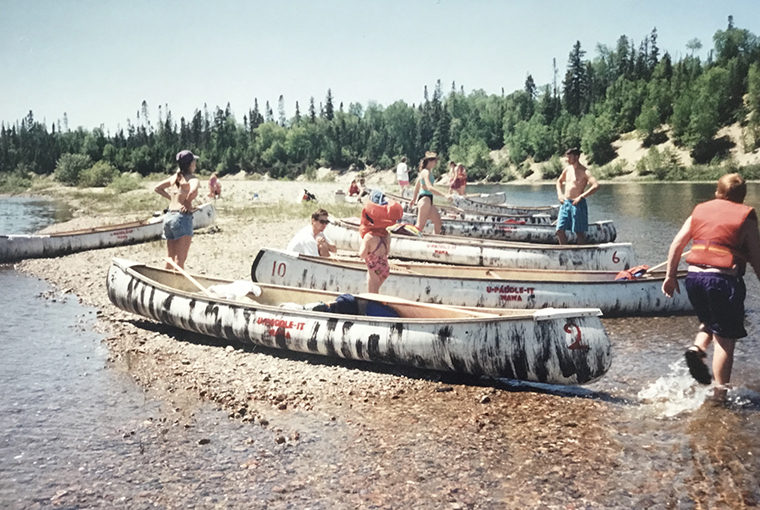
Shawn and Lancey are producing a handful of Wolverines this year – they may call them the Wolverine Canoe Revival Edition 2021, he said.
One of the first in line to buy one is one of Shawn’s friends, Hugh McKechnie, a life-long canoe enthusiast who tried out his first Wolverine in the 1970s, when he was “was dumb struck by the most beautiful canoe (he) had ever seen.”
McKechnie bought his first one at the factory off Highway 17 in Wawa in 1973 and made countless memories in it ever since, including learning that the canoe doesn’t conduct electricity thanks to a lightning strike while fishing in the 1980s.
He has also enjoyed watching his grandchildren grow up fishing and swimming from it, as well as approaching wildlife silently to capture stunning photographs and hear rarely heard sounds, such as hungry baby beavers.
Wolverine brings joy
Shawn loves seeing Wolverines like ours being restored and used, calling the canoe his reason for growing up in Wawa.
“I am grateful for the canoes’ story and my connection to it,” he wrote, noting how they connect him to his dad and form a key part of his legacy. “We tripped together. He taught me how to paddle. We would talk about the canoes … it reminds me of the great times I have had in them with my dad.”
Bobcaygeon’s Doug Farr, who completed the restoration, has repaired canoes from across North America since retiring in 1993. He’s worked just about every make including two or three Wolverines in that time, and feels they are designed as a canoe should be.
“Just enough tumblehome to make it pleasing to the eye,” he said. “I can just imagine the Wolverine would be a joy to paddle and a pleasure to fish from.”
Our family couldn’t agree more. Back at its home at the family cottage, our reborn Wolverine has already seen plenty of action, including being used by a whole new generation. Safe to say, there will be plenty more fishing in its future.



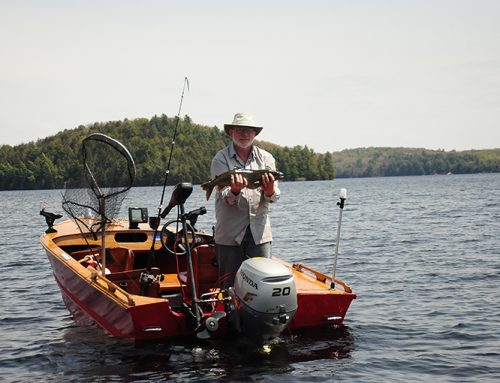
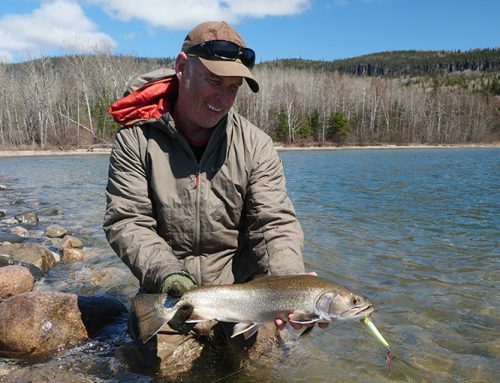
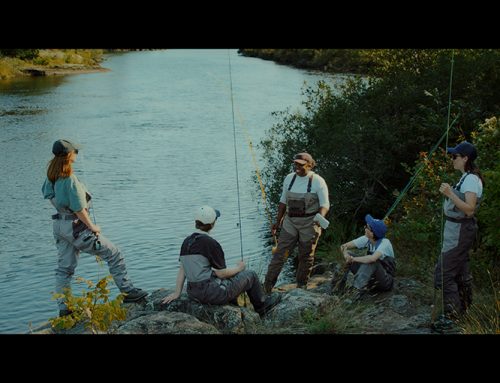

I aquirred one of theses canoes back in 2009 for an older gentleman from Wawa. Gunwhales need to be replaced but overall still in good condition. I love the history behind theses vessels. Author is correct about the canoes stability on account of it’s overall weight tho, one must be strong to transport a wolverine. Awesome article
Thanks for the note and kind words, Joe.